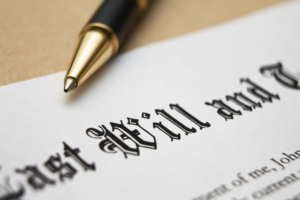
Rest assured, you are not the only person thinking it – that you are too…young, healthy, busy, financially unprepared, etc. to concern yourself with whether or not you have a Last Will and Testament. Everyone – young and old, healthy and unhealthy, with limited or limitless financial resources – should have a Will.
Frequently Asked Questions Regarding Wills:
I’m young, Why do I need a Will?
If I own everything jointly with my spouse, what is the point of having a Will?
A Will just means that my family will have to go through probate, and pay taxes. No Will means no probate, right?
What happens if I die without a Will?
What if I have young children?
Do I need to worry about estate taxes?
Who Should I appoint as Executor?
How long does a Will last?
Can I change my Will?
Is a revocable living trust better than a Will?
I’m convinced – I need a Will. What next?
I’M YOUNG. WHY DO I NEED A WILL?

No matter how young or old you are, you need a Will. Life moves quickly, and is full of uncertainty. The only moment we are guaranteed is the moment in which we are living right now. Wills help your loved ones understand your wishes, and empower the person or persons you choose to handle your affairs to do what is necessary to carry out those wishes.
If you have any assets (and you do), and if you want a say in how your assets pass at your death and the person in charge of making that happen, then you need a Will. We can help. Click here to take the next step and set up an appointment with an attorney.
IF I OWN EVERYTHING JOINTLY WITH MY SPOUSE, WHAT IS THE POINT OF HAVING A WILL?

First, it is highly unlikely that every single asset you own is titled jointly with rights of survivorship with your spouse. If there is even one account, one savings bond, one share of stock titled in only your name or your spouse’s, then the surviving spouse will likely have to go through the probate process upon the death of the first spouse. Even if all assets are owned jointly, that only meets the needs of the first spouse to die. If the surviving spouse dies without a Will, and there are a number of reasons why the survivor may be unable to execute a Will when the time comes, then your loved ones may find themselves with a very difficult estate administration procedure that could have been avoided by both spouses executing Last Wills and Testaments.
A married couple needs Wills to determine where their assets, joint or otherwise, will go upon the death of the survivor of them. Planning now is the best way to save your spouse, and the rest of your loved ones, a lot of heartache and a huge headache on down the road.
A WILL JUST MEANS THAT MY FAMILY WILL HAVE TO GO THROUGH PROBATE AND PAY TAXES. NO WILL MEANS NO PROBATE, RIGHT?

Regardless of whether or not a person has a Will, that person’s family and friends will have to navigate the probate process if there are any probate assets. Probate assets are those assets that are not jointly owned with survivorship, and which do not pass by beneficiary designation, pay-on-death designation, or transfer-on-death designation. Almost everyone owns at least some probate assets at the time of his or her death. Thus, unless you create and “fully fund” a revocable living trust, there will almost certainly be a probate of your estate upon your death.
Fortunately, the probate process in Virginia is not an insurmountable hurdle. With some guidance, probate can be made a much less difficult process. How a person’s assets are titled is what determines whether or not that person’s estate must be probated.
WHAT HAPPENS IF I DIE WITHOUT A WILL?
There are ramifications for your estate and your loved ones if you die without a Will. First, if you do not have a Will, you forfeit the right to dictate how your assets will pass at your death. The law of intestacy will govern who takes your assets. Right now, Virginia law states that if you die without a Will, your entire estate will pass to your surviving spouse, if you have one, upon your death. (Note: If you have children from a relationship or marriage other than those with your current spouse, then a portion of your estate will go to your spouse, and a portion will be split between all of your children, or their descendants.) If you die without a spouse, then your estate will be split equally between your children (exclusive of unadopted stepchildren), or if you have no issue (children, grandchildren, and so on), it will pass to your parents. If your parents are not then living, your estate will be divided between your siblings (or their descendants). If none, then half of your estate will be split between your closest paternal relatives, and half will be split between your closest maternal relatives.

Often, people think that if they were to have a Will prepared, they would likely provide for distribution similar to that of Virginia’s intestacy laws. However, you must consider that the law can and does change. Just because the law says one thing right now does not mean it will not be changed in five, ten, or twenty years. Furthermore, even if you think that Virginia’s intestacy law would provide the distribution you would desire, remember that only those who have Wills can decide not only who the beneficiaries of their estate should be, but also when and how those beneficiaries are to receive any assets. This is particularly important if you have minor children (see What if I have young children?, below) or if there is any chance that your estate may be subject to federal estate taxes (See Do I need to worry about estate taxes?, below).
As another complicating factor, if an intestate decedent (i.e. a person dying without a Will) owned real property, and if the Administrator needed to sell the real property, he or she would have to file pleadings with the Court in order to request to have the authority to handle the real property. This, when necessary, adds expense and delay to an already expense and long process.
WHAT IF I HAVE YOUNG CHILDREN?
It may be easier to describe what happens with your children if you were to die without a Will. If you die unmarried and without a Will (or if you and your spouse die in a common accident), Virginia law provides that your entire estate will pass to your children. If, for example, you have two children, ages four and seven, each child will receive one half of your estate. Because minor children do not have the capacity to make financial decisions, someone will have to go to court to be appointed the children’s financial guardian. Once that occurs, that financial guardian will be required to file accountings with the Commissioner of Accounts every year until each child turns eighteen. During that time, however, the Guardian has very limited access to the funds, and often must go through procedures with the Commissioner of Accounts in order to access the funds for the children. Once each child turns eighteen, he or she will receive outright whatever funds remain, and each child may use that money however he or she wishes.

These procedures, which are inevitably expensive with court costs and annual filing fees, are really just a band-aid on a situation that could have been much better if the parents had been proactive by executing Wills. By having a Will, you can ensure that your children’s needs are met, that there are funds available for their education, and that they are allowed to mature before being given the responsibility of managing what may be, especially to an eighteen-year-old, a great deal of money.
Also, if you have children, especially young children, one of the most important decisions you make for your children is determining who would take care of them if anything were to happen to both parents. That decision, the appointment of a Guardian, is done through your Will.
In summary, if you have a Will, you can determine who cares for your children, what assets your children will receive from your estate, and when they receive those assets. Even though it is nearly impossible to imagine not being here to care for your children, life is uncertain, and you can act now to make sure your children have the care they need tomorrow – no matter what tomorrow holds in store.
DO I NEED TO WORRY ABOUT ESTATE TAXES?

Under the current tax law, the current estate tax exemption is $11.7 Million. However, that really high exemption is scheduled to drop to $5 Million in 2026. Beyond that, Congress can take action before that time to lower the estate tax exemption. Given the economic and political uncertainty, it may be prudent for individuals and couples to consider tax planning even if their assets do not approach the current exemption amount. If there is even a slight chance that your estate may be subject to estate taxes, then you should make an appointment with an attorney to discuss tax planning, and other steps you can take now that may save you literally hundreds of thousands of dollars in taxes.
Apart from estate taxes, there are other tax considerations that should be a factor in any comprehensive, tailor-made estate plan – for example, income taxes. When you are discussing your estate plan with one of our attorneys, one of the issues we are going to evaluate is whether there are opportunities to save on income taxes, such as capital gains, for you or for your beneficiaries. Click here to contact us to arrange an appointment.
WHO SHOULD I APPOINT AS EXECUTOR?

The person you name to serve as Executor of your estate will facilitate your estate administration upon your death, which may include qualifying as Executor at the Circuit Court, attending to other probate proceedings and records, collecting and managing assets (possibly including the sale of any real estate), paying bills and expenses, and distribution of assets pursuant to your Will, etc. Basically, the Executor’s role is to address the creditors of your estate and then to get your assets to those designated to receive them under your Will. If you transfer some or all of your assets into a living trust, then the Executor’s responsibilities may be less cumbersome. If there are no probate assets (i.e. no assets that pass through your Will to beneficiaries of the estate) because your assets pass by beneficiary designation or because you transfer all of your assets into your living trust during your lifetime, then the Executor will not be required to comply with probate procedures. The role of the Executor, and his or her responsibilities and authority under your Will, only exist upon your death. While you are alive, the person named as Executor has no authority over your assets, and you may change the person you designate as Executor at any time.
If you anticipate there being probate assets that may require the Executor to administer your estate in accordance with Virginia probate procedures, then you will want to choose someone you trust to serve in that capacity. Virginia does have procedures in place to assure that an Executor does what he or she is supposed to do, but you still should identify a person whom you believe will administer your estate with integrity and efficiency. Also, although the probate process is not overly difficult, it can be a more difficult process when a person is grieving. As such, you may want to consider naming as your Executor someone who is level-headed and capable of making sometimes difficult decisions in an already difficult time.
It is important to remember that even if you do not have a Will and do not appoint anyone as Executor, it is almost certain that someone will still be required to go through the probate process – formally or informally. If you fail to have a Will prepared, you forfeit your opportunity to choose who will handle your estate upon your death.
HOW LONG DOES A WILL LAST?

A properly executed Will lasts until you revoke it, but the Will does not “speak” (i.e. have any legal effect) until death. Wills are revocable documents as long as you have the capacity to revoke them. If at some point, because of age or infirmity, you no longer have the capacity to recognize the people who would most likely benefit from your estate, or if you cannot understand the nature and extent of your assets, then you may not have the ability to revoke your Will. Neither would you have the ability to execute a Will at that point. This is yet another reason why it is so vitally important to be proactive in your estate planning. You may not have the capacity to make your wishes known later, so you may have more peace of mind by making them known today.
CAN I CHANGE MY WILL?
As long as you have capacity to create a new Will (you recognize the people who would most likely benefit from your estate, and understand the nature and extent of your assets), you have the capacity to change your existing Will. Depending on the circumstances, you may wish to amend your Will by executing a Codicil to your Will, or you may be better served by having a new Will prepared.
If you have previously executed a Will, it is generally advisable to review that document every three to five years with an attorney. This is to ensure that your Will still aligns with Virginia law, and that any changes in your circumstances, or the circumstances of those who will benefit from your estate, are reflected in your current Will.
IS A REVOCABLE LIVING TRUST BETTER THAN A WILL?
Sometimes. The answer to that question depends on a number of circumstances unique to each client. For example, if your estate may be subject to estate taxes, then you may receive enormous benefits from tax planning via a revocable living trust. Also, if you have fairly substantial life insurance, then there are a number of practical benefits and tax benefits to have those funds filtered through a living trust. Living trusts can help protect assets from creditors of your beneficiaries, which can save the people you love a great deal of grief and a great deal of money, and also may allow you to avoid probate, which can be a cumbersome and expensive process.
Our discussion on trusts goes into this discussion further. More complicated issues, however, should be discussed with an attorney, and we would like to help equip you with the knowledge and planning that best suits your individual needs. Please feel free to contact us to arrange an appointment.
I’M CONVINCED – I NEED A WILL. WHAT NEXT?

Your next step is contacting a knowledgeable and trustworthy attorney who can help you determine what your individual needs are, and then come alongside you to begin down the path that will give you peace of mind today and your loved ones an easier transition in the future. Let us help you as you take the next step. Click here contact us to begin the process of creating your estate plan.